
USA Today via Reuters
Sep 2, 2021; Flushing, NY, USA; Reilly Opelka of the United States celebrates after recording match point against Lorenzo Musetti of Italy in a second round match on day four of the 2021 U.S. Open tennis tournament at USTA Billie Jean King National Tennis Center. Mandatory Credit: Jerry Lai-USA TODAY Sports

USA Today via Reuters
Sep 2, 2021; Flushing, NY, USA; Reilly Opelka of the United States celebrates after recording match point against Lorenzo Musetti of Italy in a second round match on day four of the 2021 U.S. Open tennis tournament at USTA Billie Jean King National Tennis Center. Mandatory Credit: Jerry Lai-USA TODAY Sports
Tennis in 2025 has been nothing short of chaotic, its rulebook tested and tempers flaring under the spotlight. On day one of the US Open, 2021 champion Daniil Medvedev sparked mayhem by rallying the crowd to delay his match against Benjamin Bonzi for six minutes while facing match point all because of a stray photographer. And now, as the season nears its end, fresh controversy brews in Paris as Reilly Opelka’s ‘Lucky-Loser’ entry has turned the Masters draw into a storm.
Watch What’s Trending Now!
Just before the curtain rose on the final Masters 1000 event of the season, the Paris Masters was hit by a storm of intrigue. The chaos centered around Reilly Opelka, the towering American whose name suddenly became the talk of the tournament.
Scheduled to play the second round of qualifying on Sunday, Opelka withdrew from the match, handing Aleksandar Vukic a free pass to the main draw without even stepping onto the court. Yet, the real twist came moments later, when Opelka’s name reappeared on the main draw list as a lucky loser.
ADVERTISEMENT
With the draw already finalized, confusion rippled through fans and officials alike. The explanation, however, was buried in the rulebook. At least one main draw withdrawal had already been confirmed: Czech rising star Jakub Mensik, who pulled out days earlier after ending his season following his withdrawal from the Swiss Indoors Open. Soon after, another name fell, Frenchman Benjamin Bonzi, sidelined due to injury. Suddenly, two vacant spots opened up for lucky losers, adding fuel to an already bizarre scenario.
Reilly Opelka gives a walkover in the QR2 and then wins the LL draw to enter anyway.
How is this allowed? https://t.co/qqia6ile9N
— José Morgado (@josemorgado) October 26, 2025
According to ATP tournament regulations, lucky losers are determined by ranking among players who lose in the second round of qualifying. Opelka, ranked No. 62, happened to be the highest-ranked among them. This meant that, regardless of the outcome of his scheduled match against Vukic, his entry into the main draw was mathematically secured. The American, knowing this loophole all too well, opted to withdraw, saving himself the physical toll while guaranteeing a spot in the tournament anyway.
ADVERTISEMENT
Thus, Reilly Opelka, former world No. 17 and no stranger to headlines, found himself walking straight into the Paris Masters main draw without swinging a racket in qualifying.
He will face home favorite Corentin Moutet in the opening round. Joining him as the second lucky loser is fellow American Aleksandar Kovacevic (No. 65), who will take on Miomir Kecmanovic. The twist not only exposed a rare exploit in ATP rules but also reignited debate about the fairness of the lucky loser system in elite tennis.
ADVERTISEMENT
Meanwhile, the Paris qualifiers produced seven other main-draw entrants, completing the roster for the season’s last Masters 1000 event. Among the players who successfully battled their way in were Sebastian Korda (No. 56) and Tomás Martín Etcheverry (No. 60), both eager to make late-season statements. But for every success story, there was heartbreak. Big names like Jenson Brooksby (No. 55), Adrian Mannarino (No. 58), Valentin Royer (No. 69), and Botic van de Zandschulp (No. 82) all bowed out, leaving their Paris dreams behind.
And if anyone thought this was Opelka’s first brush with controversy, they’d be mistaken. The American, known for his unfiltered opinions and fiery on-court demeanor, has never been far from tennis drama.
From heated exchanges to bold critiques, Opelka has long walked the line between confidence and chaos, and in Paris, he’s done it again, bending the rules without breaking them, and turning a loophole into opportunity.
ADVERTISEMENT
Reilly Opelka slams ATP as he reveals shocking Indian Wells fine details
Reilly Opelka’s 2025 season has been anything but quiet, and the echoes of Indian Wells still follow him into Paris. In his first-round clash at the Desert Classic, the towering American found himself locked in a fiery exchange with chair umpire Nacho Forcadell over poor lighting conditions. As tension mounted, Opelka called for the physio after the umpire refused to stop play, a move that only intensified the chaos. Forcadell insisted it was “not the right way to stop play,” but Opelka sat defiantly on his bench, forcing the physio’s eventual arrival to treat a wrist issue.
When the lights finally flickered on, Opelka agreed to resume, but not without consequence. His frustration earned him a code violation for unsportsmanlike conduct, and the match ultimately slipped away 7-5, 6-4 to Roman Safiulin. For most players, that would have been the end of it. But Opelka’s saga didn’t stop at match point.
ADVERTISEMENT
Nearly four and a half months later, the American reignited the fire himself. Taking to Instagram, he shared a screenshot of the official ATP document detailing the fines he received from that stormy night. The post revealed not only the steep penalties but also his unfiltered words that landed him in hot water: “Nacho is an idiot.” Across the image, Opelka wrote, “The ‘i’ word can be expensive @atptour,” dripping with sarcasm and defiance.
Top Stories
WATCH: Carlos Alcaraz Gives Retirement Scare as Alexander Zverev Left Stunned in Shocking On-Court Scenes
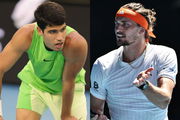
Alexander Zverev Admits He Was “Hanging on for Dear Life” After Brutal Australian Open War With Carlos Alcaraz
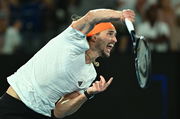
Alexander Zverev Loses Patience During Carlos Alcaraz’s Injury Delay as Tensions Rise at Australian Open
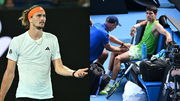
Carlos Alcaraz Breaks Silence on Injury Scare After Gritty 5-Hour Australian Open Win Over Alexander Zverev
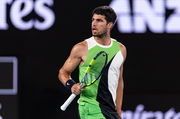
Novak Djokovic Makes Financial Demand to Australian Open After Thrilling Jannik Sinner Match
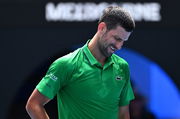
Now, with the dust from Indian Wells still in the air, Opelka strides into the Paris Masters main draw, set to face local hero Corentin Moutet.
The lights will shine brighter, the crowd louder, and the question lingers: will the Americans’ power and defiance spark redemption, or another storm on French soil?
ADVERTISEMENT
ADVERTISEMENT
ADVERTISEMENT
ADVERTISEMENT